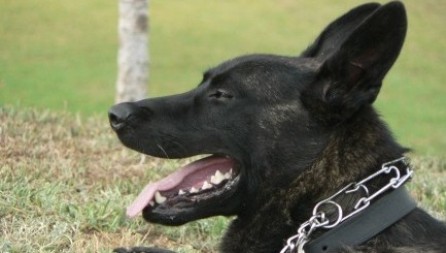Dutch Shepherd FAQ's
Q. Is a Dutch Shepherd like a German Shepherd or Belgian Shepherd?
A. A Dutch Shepherd Dog is similar yet different to these two breeds. A Dutch Shepherd comes in four varieties in the same way a Belgian Shepherd Dog does, and historically it was used as a herding dog. The Dutch Shepherd also has a colour difference to both these breeds, being that it is brindle coloured.
Q. Is the Dutch Shepherd as popular as the German Shepherd and Belgian Shepherds?
A. No, the Dutch Shepherd is less popular than both those breeds. In the FCI Pedigreed show world the Dutch Shepherd is less popular than both. In dog sports it is also less popular in number than both the German and Belgian Shepherds. In the national dog sport of the Netherland (KNPV) the Dutch Shepherd is one of the main breeds used. It is from these KNPV unregistered bloodlines that the working bloodlines come from.
Q. What is the difference between the FCI Pedigreed and the unregistered KNPV Dutch Shepherds?
A. The main difference is that the FCI Pedigreed Dutch Shepherds are really only used for, and capable of, being show dogs, where as the KNPV dogs are only breed for work. In terms of looks the KNPV dogs are generally bigger dogs, with bigger heads and stronger bones. In terms of working abilities, the KNPV dogs have stronger nerves, far higher drives and courage than the FCI dogs.
Q. If I want to compete in the show ring, what type of Dutch Shepherd should I go for?
A. The only real option is to go for are the FCI Pedigreed dogs. It is not possible to compete in the show ring with an un-registered KNPV bloodline Dutch Shepherd. Steer clear of anyone saying anything different.
Q. What type of Dutch Shepherd should I look for if I want to do police type work with?
A. The only real option for this type of work is the unregistered KNPV Dutch Shepherds. The chances of getting a dog capable of high level police work with the FCI dogs is just too small. Stay clear of anyone saying anything different.
Q. Wont I be able to trace the ancestors of my dog if I have a pedigreed dog?
A. Unfortunately no. The fact remains that a very high percentage of FCI Pedigreed dogs have false pedigrees and so you cannot trust the accuracy of the pedigrees.
Q. Why do they have false pedigrees?
A. As the working abilities of the FCI Pedigreed dogs is so poor the working people within the pedigreed dogs have out-crossed to the unregistered KNPV dogs to help improve their dogs.
Q. Does the Dutch Shepherd make a good family pet?
A. While they settle into a family environment very well, and are very loyal and good to their family members, they are a working dog. Just like all high drive working dogs they need to have an outlet for their drive and energy. If you buy a working Dutch Shepherd it is best advised to undertake training from an early age, and if possible to attend a working dog-sport club such as Schutzhund/IPO, where you will learn to handle, work and control your dog. If they do not have an outlet and regular exercise they may become noisy barkers or destructive in your yard or house.
Q. What health problems exist in the breed?
A. While nowhere near as bad as the German Shepherd, the main problems tend to be hip and elbow issues. To put it in context, the OFA (Orthopedic Foundation of America) keeps statistics of all x-ray results taken in the USA. According to their database the Dutch Shepherd has 91.2% of all hip x-rays showing good results while the German Shepherd had 78.9% of all hip x-rays showing doog results. With the elbow x-rays the Dutch Shepherd has 99.1% good results compared to the German Shepherd showing 80.6% good results. While better than the German Shepherd, it is still recommended to only buy a Dutch Shepherd from breeders who x-ray the parents of the litters.
For us, the qualities we strive for are :
- Extreme Drives (Fight, Prey and Hunt)
- High Thresholds
- Strong Nerves
- Full and Hard Grips
- Handler Hardness
- High Confidence
- High Levels of Dominance
- A-Social Type Behaviours
- Good Bone and Substance
- Excellent Hips and Elbows
